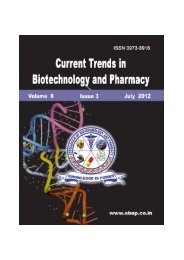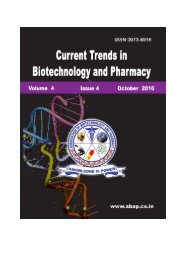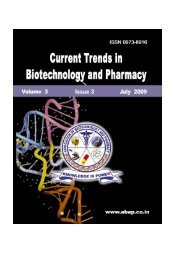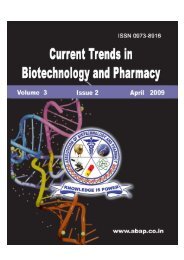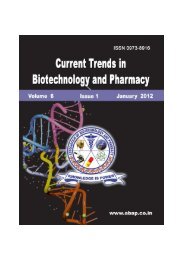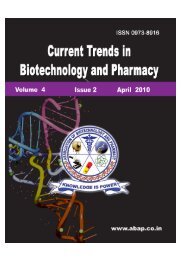d(GC) - Association of Biotechnology and Pharmacy
d(GC) - Association of Biotechnology and Pharmacy
d(GC) - Association of Biotechnology and Pharmacy
Create successful ePaper yourself
Turn your PDF publications into a flip-book with our unique Google optimized e-Paper software.
Current Trends in <strong>Biotechnology</strong> <strong>and</strong> <strong>Pharmacy</strong><br />
Vol. 6 (2) 119-144 April 2012, ISSN 0973-8916 (Print), 2230-7303 (Online)<br />
in the intracellular tyrosine kinase domain <strong>of</strong> the<br />
receptor involving exons 18 to 21, for which exon<br />
length ranges from 99bp (exon 19) to 186bp<br />
(exon 20) (26, 27, reviewed in 28). EGFR with<br />
activating mutations in these exons are sensitive<br />
to tyrosine kinase inhibitors (TKIs), such as<br />
gefitinib <strong>and</strong> erlotinib, both approved by the US<br />
FDA. These competitively bind to the ATPbinding<br />
cleft <strong>of</strong> the tyrosine kinase domain <strong>and</strong><br />
their use significantly improves progression-free<br />
survival in patients with EGFR-mutant tumors,<br />
but not those with unmutated EGFR (29).<br />
Genotyping <strong>of</strong> exons 18, 19 <strong>and</strong> 21 <strong>of</strong><br />
EGFR in patients with advanced lung<br />
adenocarcinomas, especially patients who are<br />
non-smokers, women <strong>and</strong> those with Asian<br />
ancestry (27, 29-31), will identify patients<br />
sensitive to TKIs <strong>and</strong> may improve quality <strong>of</strong> life<br />
<strong>and</strong> survival among lung cancer sufferers in the<br />
developing world through the selective use <strong>of</strong><br />
TKIs after the failure <strong>of</strong> st<strong>and</strong>ard first-line<br />
chemotherapies. This test will be especially<br />
useful in China, Japan <strong>and</strong> south-east Asia, <strong>and</strong><br />
those low- <strong>and</strong> middle-incomes countries which<br />
have significant numbers <strong>of</strong> migrants from these<br />
regions, such as Panama (32).<br />
The second application <strong>of</strong> personalized<br />
medicine to lung cancer management is the<br />
genotyping <strong>of</strong> EGFR <strong>and</strong> KRAS for mutations that<br />
predict the development <strong>of</strong> resistance to TKIs.<br />
In exon 20 <strong>of</strong> EGFR, the presence <strong>of</strong> the T790M<br />
substitution is associated with gefitinib resistance<br />
(33), <strong>and</strong> is a valuable predictor <strong>of</strong> patients who<br />
will show primary resistance to TKIs, as well as<br />
a molecular marker for patients formerly<br />
responsive to TKIs, but demonstrating<br />
therapeutic failure.<br />
KRAS is one <strong>of</strong> the first GTPases in the<br />
phosphorylation cascade activated by EGFR.<br />
Activating mutations in KRAS codon 12 are<br />
observed in about 30% <strong>of</strong> NSCLCs (34) <strong>and</strong> most<br />
commonly in patients with a history <strong>of</strong> smoking<br />
(35). Activating mutations also observed in codon<br />
13 <strong>and</strong> rarely in codons 59 <strong>and</strong> 61 (34, 36).<br />
Codon 12 <strong>and</strong> 13 mutations are associated with<br />
Rebecca E. Smith <strong>and</strong> Juan Miguel Pascale<br />
126<br />
primary resistance to gefitinib <strong>and</strong> erlotinib (35),<br />
<strong>and</strong> as such, identify another group <strong>of</strong> patients<br />
who will not respond to TKIs.<br />
Unfortunately, there is no reliable presymptomatic<br />
testing for lung cancer, which would<br />
significantly reduce the proportion <strong>of</strong> patients<br />
presenting with advanced cancers <strong>and</strong> increase<br />
the likelihood <strong>of</strong> survival through early detection<br />
<strong>and</strong> treatment. Similarly, genes with reliable<br />
prognostic value are limited: since 2001, a large<br />
number <strong>of</strong> studies have surveyed lung cancers<br />
for genetic markers which will predict disease<br />
outcome, refining the number from over 800 (15)<br />
to five (37). However, much debate remains<br />
about the utility <strong>of</strong> specific genetic markers, no<br />
clinical test is in routine use, <strong>and</strong> the application<br />
<strong>of</strong> such tests in resource-poor settings is some<br />
way <strong>of</strong>f. Until reliable biomarkers for early<br />
detection <strong>and</strong> prognosis are identified, the best<br />
methods for preventing the development <strong>of</strong><br />
advanced lung tumors will remain reduction <strong>of</strong><br />
lung cancer risk factors through community<br />
education, <strong>and</strong> traditional radiographic screening<br />
for early-stage cancers. Nonetheless, value<br />
remains in genotypying lung cancer biopsies to<br />
assess sensitivity to TKIs.<br />
Colorectal cancer : Colorectal cancers are one<br />
<strong>of</strong> the top five causes <strong>of</strong> cancer <strong>and</strong> cancer death<br />
worldwide (Table 2), <strong>and</strong> may arise sporadically<br />
or be caused by inherited mutations. Many begin<br />
with the mutational inactivation <strong>of</strong> the<br />
Adenomatous Polyposis Coli (APC) gene, a<br />
tumor suppressor which leads to dysregulated<br />
gene transcription, inactivation <strong>of</strong> other tumor<br />
suppressor genes <strong>and</strong> activation <strong>of</strong> protooncogenes<br />
(38). There is a small decrease in<br />
the likelihood <strong>of</strong> survival for patients with<br />
colorectal cancer in the developing world<br />
compared to developed countries (Table 3).<br />
Reliable applications for personalized medicine<br />
in the management <strong>of</strong> these cancers include presymptomatic<br />
risk assessment, diagnosis <strong>and</strong><br />
tumor typing for drug selection.<br />
Approximately 10% to 30% <strong>of</strong> all colon<br />
cancers occur with some heritable basis (39) <strong>and</strong>



